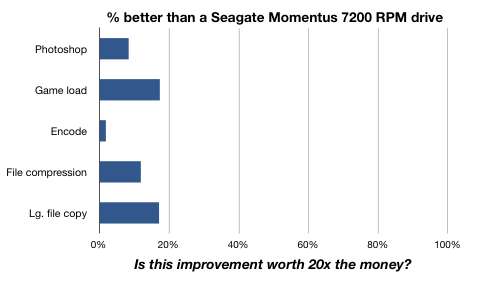Flash drives get a fight from disks

I used - and loved - a Windows flash disk notebook for 5 years. The flash drive doubled my battery life and gave me a better sleep mode better than any I've had since - PC or Mac. I've been excited to see flash drives moving into the notebook mainstream.
But today's flash drives aren't living up to the hype. Many technologies have tried - and failed - to replace the hard drive over the past 50 years. While SSDs have the best chance yet, I'm no longer convinced they'll win.
The latest blow Some new benchmarks show a honking fast 90 MB/sec flash drive could barely beat a 7200 RPM in large file oriented application benchmarks. The flash drive kills on bandwidth and access time - less than 1 ms - and it is hardly any faster in an application benchmark? Something is very wrong.
Case in point: the 7.2k notebook drive There were some surprising results from an AnandTech review last week that tested 3 drives on a 4 GB laptop running Vista Home Premium. The drives were:
- A 32 GB MTRON SSD MSD-SATA6025
- A Seagate Momentus 7200.2 160GB
- A Samsung MH80 FlashON 160GB
All flash, no flash and half-flashed The 32 GB Mtron is a high-performance flash drive, the 2.5" Momentus a 7200 RPM disk drive and the Samsung a 5400 RPM hybrid drive with a 256 MB flash buffer. The Momentus has a 3 Gbps SATA interface. The others have 1.5 Gbps SATA, which is faster than either drive's data rates.
Mtron can maintain a steady 90 MB/sec, while the Momentus at 49 MB/sec and the Samsung at 38 are considerably slower.
Application performance: Mtron vs Seagate Here's the biggest surprise: the Mtron wasn't that much faster!
Research has established that 20% is the minimum performance gain a computer user can reliably perceive. Anything less than that people can't tell apart without a stop watch. Which is why so many benchmarks take several minutes.
Application performance: Samsung hybrid vs Seagate The bigger disappointment is the Samsung hybrid drive with 256 MB of flash - about $2 worth - that costs more and is usually slower than the Seagate.
Performance: Vista standby and hibernate Here's the major performance difference between the Mtron and the Momentus. In Vista standby mode the Momentus took 4 seconds longer to enter and resume against the Mtron and the Samsung. For hibernation the delta was 6-8 seconds longer.
Power As expected, the SSD uses much less power - .55W under load - than the two spinning disks. What surprised me is that the 7200 RPM drive is only half a watt more than the 5400 RPM: 2.89 W vs 2.27 under load and a minuscule 0.02 W more at idle.
To put that into perspective, the Mtron SSD will give a 4-hour battery life laptop an extra 30-40 minutes of runtime at full load and much less at idle. Not bad, but not life-changing either.
Some reviewers agree Here are a couple of recent reviews that give a balanced appraisal of the current state of flash drives.
". . . it's a huge investment for very little performance gain, unless you have a very small amount of system memory, in which case I suggest you spend a fraction of the cost of an SSD on a memory upgrade instead." Samsung 32 GB SSD review in bit-tech.net
Another offers faint praise for both ReadyBoost and a drive:
". . . the [ReadyBoost] difference barely registers on a high-end notebook, but if you're [sic] machine is strapped for memory and underperforming, you should definitely notice an improvement." Lexar 16 GB express card review in PC World
Why the reviewer didn't also conclude you'd be better off to buy some more RAM is curious.
The Storage Bits take I've been jonesing for a new flash drive for about a year, but these numbers give me pause. The flash drive folks have to demonstrate a convincing application performance advantage or I'm staying with hard drives.
The big surprise is that other than the standby and hibernate tests the 7200 RPM Momentus was right in there with the Mtron while the Samsung drive performance was all over the map. The engineers on the hybrid drives have a lot of work to do on performance and on closing the $100 price gap between the faster Seagate and the slower, costlier Samsung.
Current SSDs have advantages that could make them a fit, if you can afford the price and the capacity limits.
- Shock resistance and reliability. I just had a notebook drive die on me after a year, so if you live on you notebook an SSD could buy you some peace of mind.
- The Mtron's high bandwidth could be attractive in HD video capture, although the capacity might chafe for editing.
- Disks today only account for 15-20% of a notebook's power consumption so eliminating them can only buy so much extra time. But that could be important for some road warriors.
The bottom line is that even though the tests stressed large sequential I/O, the much lower cost hard drive was quite competitive. For those of you ready to bury the hard drive don't forget that Seagate also has a 10k 2.5" drive as well.
This is one competitive battle that will benefit us all. May the best product win!
Update: I moved a couple of paragraphs around from the original post to get to the heart of the matter faster.
Comments welcome, of course.
